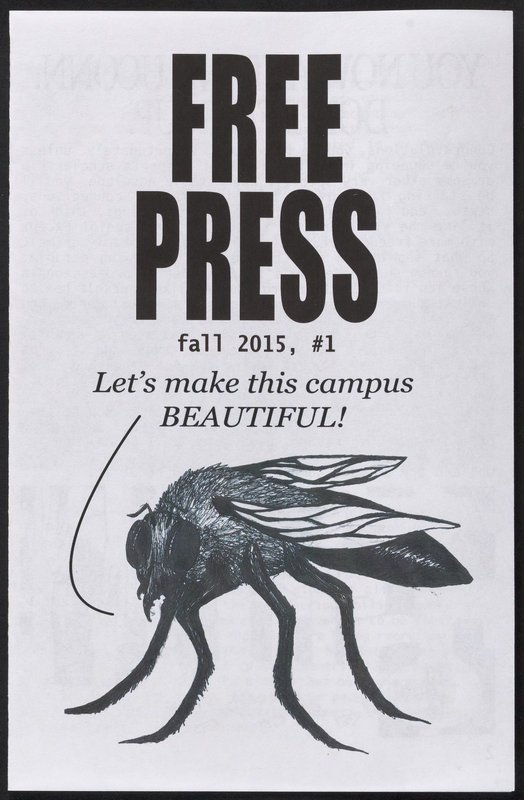This guest blog post is written by Aidan Brueckner, a graduating honors student majoring in Digital Media and Design, and minoring in Human Rights which he completed an internship for at the Archives & Special Collections in the Spring Semester of 2021. Aidan’s descriptive work can be found in the Alternative Press Collection online.
It is no secret that youth activism is on the rise. Across the world, demonstrations
occur for myriad reasons related to racial justice, climate change, drug control, and
countless more key issues. Not only are these matters far-reaching across all aspects of
society, touching on numerous disparate sectors, but the apparent frequency of social
justice events is increasing quickly as well. The push for recognition and change from a
world that has proven unforgiving and unfair is picking up steam. Naturally, college-age
students tend to be a large portion of the ones driving these agendas, as the nature of
college itself encourages collaboration and a drive to excel, as well as an increased
emphasis on critical thinking. Most importantly, however, college allows students to
collect as a group of like-minded individuals, and presents them with an opportunity to
make their voices heard. UConn is no exception, having had a well-documented history
of activism on campus from its inception. Much of this activism is contained within the
Archives, and this semester I had an opportunity to explore and evaluate some of it.
One notable item held by Archives and Special Collections that I had the pleasure
of reviewing was Ahimsa; a student-produced magazine that served as the newsletter of
Students For Peace. This issue got its start back in 1982 with the Students For Peace
branch of Eastern Connecticut State College (later renamed to Eastern Connecticut
State University), but eventually grew to become distributed at the UConn campus as
well under its Students For Peace organization. The publication does not have an
editorial stance, and encourages the submission of any and all written work so long as it
advocates for peace. The most frequently addressed topics include nuclear
disarmament, the cold war, and US Imperialism. Appropriately, the title “Ahimsa”
translates to a word meaning “non-violence” in Sanskrit. Our collection includes
numerous issues of Ahimsa, but even more are missing, which indicates prolific
publication. Reading through the file, I was able to identify several consistent
contributors as well, with some lasting past the typical four-year overturn.
I was also tasked with reviewing several issues of UConn Free Press, another
independently produced zine, with more of an emphasis on poetry, artwork, and other
creative content than Ahimsa. This is not to say that articles on issues of social justice
were not present, quite the opposite. Free Press issues are chock full of articles, covering
topics of all kinds, from veganism to the legalization of MDMA to human sexuality.
While Free Press has a documented history stretching all the way back to the 1960s, the
issues I read were much more relatable to me, having been published in the 2010s.
As I reviewed these two pieces, I realized that while they were written in different
styles, covered different topics, and looked profoundly different, there was one key
element that ran throughout them: that of student engagement, of radicalism, and of
dissatisfaction with the state of the world. UConn’s student body has always been
passionate and committed to social progress, which is echoed in the same way today as
it was ten, thirty, and even fifty years ago. What made me want to write this article,
however, was what was happening today. Under the COVID-19 pandemic, activism
among students has been relegated to the digital world. Faced with overwhelming
hardship, both personally and worldwide, students have used the internet to have their
voices heard louder than ever. An excellent example of this is how over the summer,
dozens of Instagram accounts appeared addressing issues of racial disparity at the
University. While these efforts did not appear in print, like what I have reviewed over
the past few months, that same thread flowed through them; an intense desire for
change. Activists at UConn thrived and grew, as best they could, even while isolated.
However, this rise in online activism presents a unique problem for the archival
field. How do you archive work that only appears in an online space? It can change in
appearance at any point, depending on what device it is viewed on, whereas a book is
always a book. Do you take the item as it appears on a mobile device, or a desktop? Are
the comments archived? The likes? What happens if an archived page updates, and what
if the update is minor? This is not even to mention the problems of file obsolescence, the
cost of digital storage, and the problems with actually obtaining access to something like
a social media post, or a story that is gone within 24 hours. These digital items are just
as important as the printed ones, as they reflect an unflinching commitment to the
ideals of activism that have existed at UConn for decades. We have never had an
opportunity quite like this to not only record the piece itself, but those who interact with
it, or share it. We can record not just the end product, but the drafts and the sources in
one fell swoop. But without swift action, these ephemeral artifacts may be deleted,
corrupted, or otherwise removed from the public eye, and the online activism of UConn
students may be lost.

